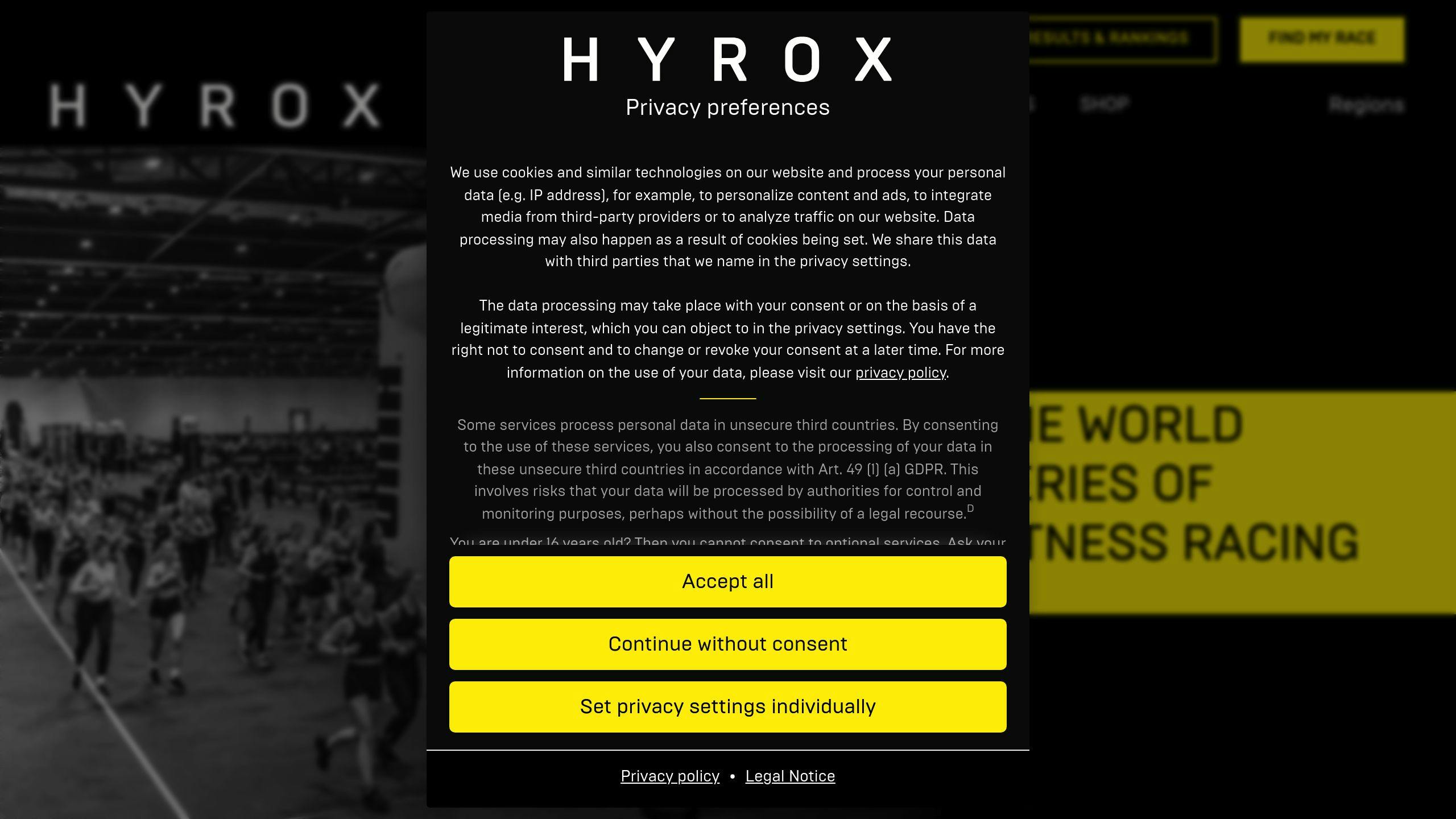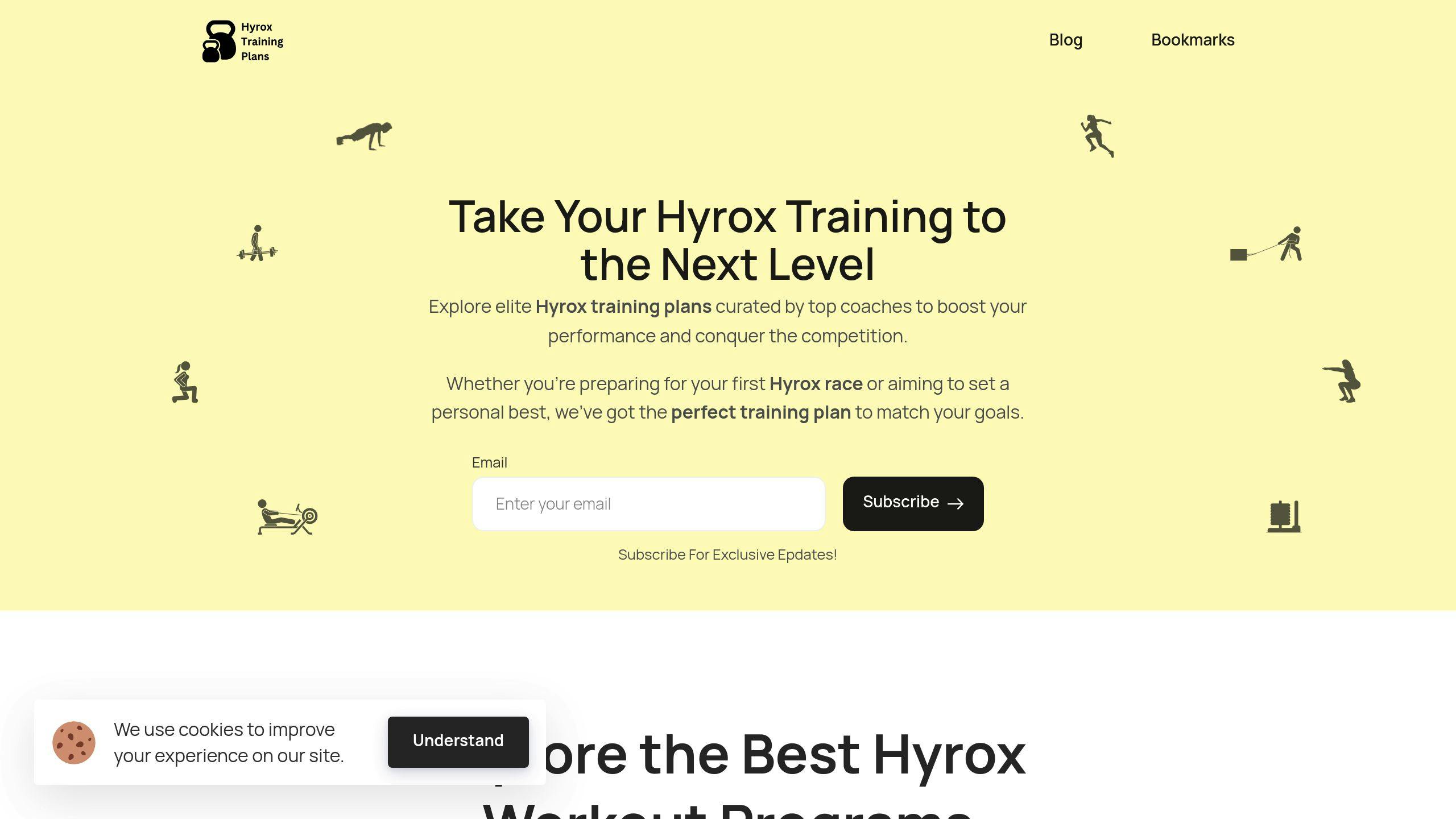Want to finish your Hyrox race faster and stronger? It’s all about pacing. The right pacing strategy balances running and fitness station efforts, helping you conserve energy and avoid burnout. Here’s what you need to know:
- Hyrox Basics: 8 x 1km runs + functional fitness stations. Running is 50% of the race.
- Ideal Running Pace: 85-90% of your standalone 10k pace.
- Station Strategies: Moderate effort on SkiErg/RowErg (70-75%), break sled pushes/pulls into intervals, and pace bodyweight exercises like burpees in small sets.
- Key Tips:
- Steady pacing beats aggressive starts.
- Manage transitions efficiently (start each station within 30 seconds).
- Monitor heart rate and adjust if you’re overexerting.
The Importance of Pacing in Hyrox

Why Pacing Matters in Hyrox
Hyrox combines running with strength stations, making energy management crucial. Athletes who keep a steady pace throughout the race typically finish 3-5 minutes faster than those with uneven pacing. This is especially important in a race lasting between 60 and 120 minutes.
Maintaining a consistent pace helps conserve energy, allowing for a stronger performance in the final stages of the race. This is a key advantage in such a demanding event and sets the foundation for determining your ideal pace, which we’ll explore further in the next section.
Factors That Influence Pacing
Several elements play a role in shaping the best pacing strategy for Hyrox:
| Factor | Impact | Strategy |
|---|---|---|
| Individual Fitness | Defines sustainable effort levels | Align pace with your current fitness level |
| Environmental Conditions | Alters energy use | Adjust for factors like temperature |
| Station Proficiency | Affects energy distribution | Reserve energy for stations you find harder |
| Course Layout | Shapes energy management | Plan for the order of stations and running segments |
To make these factors actionable, athletes should evaluate their strengths and weaknesses for each station. For example, top competitors maintain their SkiErg and Rower output within 5-10% of their maximum sustainable effort to achieve the best overall results.
Mental preparation also plays a big role in executing pacing strategies effectively. This becomes even more critical in the latter stages of the competition, where fatigue can cloud judgment.
A well-rounded pacing strategy should include:
- Efficient energy use across stations
- Smooth, effective movements
- Quick recovery during transitions
- Sharp mental focus to stay on track
HYROX Singles Race Strategy Pacing
Finding Your Optimal Hyrox Pace
Dialing in your Hyrox pace involves a strategic, data-based approach. Here’s how you can determine the best pace for your race.
Evaluating Your Fitness and Performance
Start by analyzing your fitness levels using these key metrics:
- Aerobic capacity: Test this with a 5k time trial.
- Station-specific endurance: Measure with exercises like 100 wall balls.
- Recovery speed: Check your heart rate after sprints.
Combine these tests with a 5k time trial and station-focused efforts. For running segments, aim for 85-90% of your standalone 10k pace.
"Finding your optimal Hyrox pace is about understanding your body's limits and pushing them strategically throughout the race. It's a delicate balance between conserving energy and maximizing output."
Practicing Pacing with Hyrox Workouts
Train with workouts that simulate race conditions. These hybrid sessions help you adapt to the pacing demands of Hyrox. Try this:
3 rounds:
- 1km run at your target race pace
- 50 wall balls
- 500m SkiErg
- 40 burpees
Monitor your heart rate during these sessions, aiming to stay in Zone 3-4 (70-90% of your max heart rate) to maintain a sustainable effort.
Adjusting Pace for Hyrox Challenges
Each station in Hyrox requires a different approach. Here’s a quick guide:
| Station | Effort | Tactics |
|---|---|---|
| SkiErg/Rower | 70-75% max effort | Keep a steady, manageable pace |
| Sled Push/Pull | 60-65% max effort | Break it into smaller segments |
| Wall Balls | Sets of 15-20 reps | Take short breaks between sets |
Fine-tuning your pacing for each station will help you conserve energy and perform effectively throughout the race.
sbb-itb-8bcd5e0
Pacing Strategies for Hyrox Race Segments
Running Segments: Steady Pace vs. Negative Splits
Elite athletes typically keep their run times within a tight <5% variance. Here’s how you can approach your pacing:
| Pacing Strategy | Target Pace | Best For |
|---|---|---|
| Steady Pace | 5:00-5:15/km consistently | Beginners and intermediate athletes |
| Negative Splits | Start 5-10 sec slower, finish 5-10 sec faster per km | Advanced athletes with solid endurance |
Aim to keep your heart rate within 80-90% of its maximum during these runs. How you pace your runs will directly influence your performance in the stations. Let’s break down the key strategies for those.
Pacing Tips for Specific Stations
Each station requires a tailored pacing approach to balance performance and manage fatigue effectively:
SkiErg and RowErg
Maintain a consistent pace: 1:55-2:05/500m on the SkiErg and 1:50-2:00/500m on the RowErg. Focus on steady, controlled output rather than short bursts of effort.
Sled Push/Pull
Try an interval-based approach for efficiency:
- Push or pull hard for 10-15 seconds.
- Dial back slightly for 5-10 seconds.
- Keep moving steadily to avoid burnout.
Bodyweight Stations
Consistency is key here. For exercises like burpees, aim for sets of 5-10 reps with short rests of 3-5 seconds in between. Prioritize maintaining good form over rushing through, as this helps conserve energy.
Handling Transitions and Fatigue
Beyond pacing at individual stations, managing transitions can make a big difference. Top athletes often follow the "30-second rule", starting the next station within 30 seconds of finishing the last one.
Toward the end of the race, focus on effort rather than strict pacing. Use transitions to catch your breath and maintain proper movement quality. Align your efforts with the heart rate zones you’ve practiced to stay in control.
Implementing Your Pacing Plan on Race Day
Pre-Race Warm-Up and Mental Prep
Follow this pre-race warm-up routine to set yourself up for steady pacing:
| Time Before | Activity | Focus |
|---|---|---|
| 45-30 min | Dynamic stretching | Loosen legs, back, shoulders |
| 30-20 min | Light cardio | Gradually raise heart rate |
| 20-10 min | Movement drills | Mimic race movements |
| 10-5 min | Intensity bursts | Engage fast-twitch muscle fibers |
| 5-0 min | Mental preparation | Visualize success, control breathing |
This combination of physical readiness and mental focus ensures you're primed to manage your pace effectively when the race begins.
"The key to a successful Hyrox race is finding the right balance between pushing yourself and maintaining a sustainable pace. It's better to finish strong than to burn out early." - Mike McElroy, Hyrox World Champion
Monitoring and Adjusting Pace During the Race
Keep your pace on track by balancing objective data with how your body feels:
Heart Rate Zones
- Use your breathing as a natural cue for effort - steady breathing usually means you're within your target zone.
Real-Time Adjustments
Stay alert for these signs that you’re overexerting:
- Breathing feels unusually heavy or strained
- Heart rate climbs beyond your planned range
- Your form starts breaking down during stations
- Running segments slow significantly
If any of these happen, adjust immediately:
- Slow your next run segment by 10-15 seconds per kilometer
- Focus on steady, controlled breathing during stations
Post-Race Analysis for Improvement
Right after the race, dig into your performance to identify areas for growth:
-
Data Review
Track key metrics like:- Split times for each kilometer
- Heart rate trends throughout the race
- Station completion times
- Transition durations
-
Energy Assessment
Analyze your race energy flow:- Pinpoint where you felt most fatigued
- Note momentum highs and lows
- Evaluate how nutrition and hydration affected your energy
-
Strategic Evaluation
Compare your actual performance to your pre-race plan:- Pin down where your pacing worked or fell short
- Assess which stations needed more or less recovery time
- Pay extra attention to any stations you flagged as challenging during training
Use this data to refine your strategy and align it with benchmarks from your training sessions (see 'Practicing Pacing with Hyrox Workouts').
Hyrox Training Plans: A Resource for Pacing

Structured training programs can make all the difference when it comes to mastering pacing. Hyrox Training Plans provides tailored programs designed to help athletes develop effective pacing techniques.
Advanced Pacing Workouts
The training plans include specific workouts aimed at improving pacing control. For example, SkiErg intervals emphasize steady power output, while sled push and pull drills focus on maintaining momentum without burning out too quickly.
"The key to successful Hyrox pacing isn't just about going fast - it's about finding your sustainable energy output across all stations", explains a Hyrox Training Plans elite coach.
Customized Pace Tracking
Hyrox Training Plans incorporates heart rate zone training and station-specific performance data to help athletes fine-tune their pacing strategies.
Flexible Programming
The programs adapt to your progress and skill level, aligning with the station-by-station pacing adjustments discussed earlier. Beginners start with basic pacing drills, gradually building up to more advanced techniques. Experienced athletes work on refining their pacing with:
- Hyrox-specific hybrid workouts
- Transition practice to smoothly switch between activities while keeping a steady pace
- Mental techniques like visualization to maintain focus and consistency
Athletes who stick to these methods often see noticeable improvements in their race times within 12 weeks. These strategies equip participants to execute their pacing plans with accuracy and confidence.
Conclusion and Key Points
To perform well in Hyrox, mastering pacing is all about staying precise and disciplined. Data shows that elite Hyrox athletes who pace themselves steadily finish 7-10% faster than those who start aggressively. The key takeaway? Consistent effort beats an all-out start.
Key Tips for Success:
- Ease into the race: Conserve energy during the first few stations (1-3).
- Listen to your body: Use heart rate zone tracking to adjust effort based on physical feedback.
- Prepare mentally: Visualize your race strategy and success ahead of time.
"Consistent pacing will almost certainly mean deliberately slowing yourself towards the start of the race. You will likely feel like you could be going faster (and many athletes around you will be going faster). This is mentally challenging but crucial for overall performance." - Roxlyfe.com, "How to Pace Your Running at HYROX"
At the 2022 Hyrox World Championships, top athletes maintained a 10-second variance in their 1km runs. By applying these pacing principles and analyzing your training data (refer to 'Post-Race Analysis for Improvement'), you can fine-tune your strategy for even better results.



